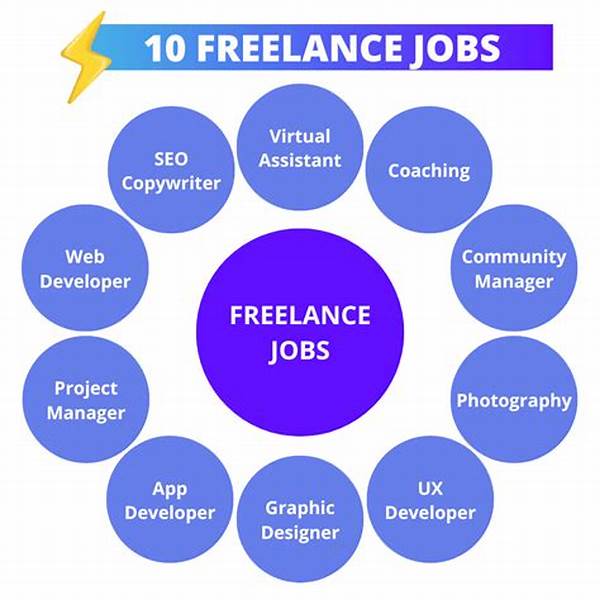
Freelancing
Freelancing, a term once whispered in the corners of the employment world, has now taken center stage. It’s a powerful phenomenon catalyzing the evolution of work environments globally. Unlike traditional 9-to-5 jobs, freelancing offers an enticing smorgasbord of flexibility and autonomy, transforming how we perceive our careers. Picture this: instead of the drone of morning traffic jams, freelancers enjoy their coffee on a leisurely morning, setting their own pace for the day. With roughly 1.1 billion freelancers worldwide, according to recent statistics, this isn’t just a temporary trend—it’s a revolution. Freelancing transforms office spaces into home offices and digital nomad hubs, leveraging technology and creativity.
Read More : Freelancing Indonesia
Freelancers find themselves wearing multiple hats: they are marketers, accountants, project managers, and creatives all rolled into one. The allure is undeniable—a chance to sculpt one’s professional life, balancing personal ambitions with financial goals. This flexible framework attracts not just the millennials and Gen Z looking for novel experiences but also seasoned professionals eager to transition into independent ventures. Comprehensive studies highlight how freelancers tend to report higher job satisfaction levels due to the diverse experiences and fresh challenges each project brings. But how does one take the plunge into this lucrative ocean of opportunities? That’s where the sales pitch comes in: understanding and leveraging your unique selling point is crucial. What sets your skills apart in a crowded market?
The excitement of freelancing comes with its own set of challenges—irregular income, lack of job security, and the constant pressure of finding new clients. However, the desire to break free from the shackles of traditional employment has propelled numerous individuals to navigate these obstacles successfully. Websites like Upwork and Fiverr have become burgeoning marketplaces of ideas, services, and talents, showcasing the incredible feats freelancers accomplish daily. Today, freelancing is no longer just a means to an end but a lifestyle choice where passionate individuals turn dreams into reality.
The Rise of Freelancing Platforms
Freelancing platforms have democratized employment opportunities, leveling the playing field for skilled individuals regardless of geography. These platforms offer protection and a plethora of resources for new and seasoned freelancers. But how do they really work, and what secrets lie behind their algorithmic facades? Stay tuned as we dig deeper into this marvelous world that’s changing the face of work as we know it.
—
Objectives of Freelancing
Freelancing isn’t just about being your own boss; it’s a dynamic journey with tangible objectives that guide each decision. The primary objective is to attain a work-life balance that resonates with individual aspirations. Freelancing offers the unique opportunity to blend personal interests with professional pursuits seamlessly. Whether it’s a freelance writer traveling the world without quitting their job or a graphic designer splitting time between family and projects, freelancing crafts a customized lifestyle unattainable through traditional employment.
For many, freelancing provides a pathway to financial freedom. By controlling their workload and rate, freelancers can potentially earn more than their counterparts in conventional jobs. This financial autonomy is coupled with the excitement of varied work assignments, allowing freelancers to continuously hone their skills and expand their portfolios. They aren’t bound by monotonous roles but can diversify their offerings—one day, designing a website; the next, crafting a video marketing script.
Tailoring business objectives to personal goals in freelancing can be both liberating and confusing. The ability to choose clients and projects means aligning work closely with personal values and interests. However, this can also lead to overcommitment or undervaluing one’s efforts. Therefore, setting clear boundaries and objectives becomes paramount for sustainable freelancing success.
Networking is another critical objective. In freelancing, relationships are currency. Building a broad network can open doors to new opportunities and collaborations, immensely enhancing one’s reach and credibility. The ability to command repeat business and receive referrals is highly reliant on the strength and professionalism of these networks.
While technology aids in streamlining operations, staying updated with market trends is essential. Part of freelancing’s objectives includes perpetual learning and adapting. Whether mastering a new software or keeping up with industry advancements, freelancers must remain at the forefront, ensuring their skills remain in demand.
Freelancing: An Ever-Evolving Landscape
Adapting to Market Needs
The market terrain isn’t static, and neither can freelancers be. Adapting to market needs is akin to surfing on changing tides—requiring skills, foresight, and sometimes, sheer gutsy perseverance. This adaptability can be a freelancer’s most significant asset, leading to new paths and potential success.
—
Freelancing Discussions
- The impact of technology on freelancing
- Freelancing as a career choice for millennials
- How to handle taxes in freelancing
- The role of online freelancing platforms
- Balancing multiple freelancing projects
- The future of freelancing post-pandemic
- Networking strategies for freelancers
- Setting rates and getting paid
- Freelancing and work-life balance
In today’s rapidly evolving job markets, discussions around freelancing have gained considerable traction, acting as catalysts for change and innovation. The impact of technology on freelancing, for example, cannot be overstated. It’s transformed how freelancers connect with clients, manage projects, and deliver services. Similarly, freelancing has become an alluring career choice for millennials, who prize flexibility and purposeful engagement over conventional job security. But as enticing as it is, freelancing requires serious consideration regarding taxes and legalities. Proper understanding and handling of taxes can prevent future financial missteps.
Platforms like Upwork, Fiverr, and Freelancer play significant roles in this ecosystem, serving as bridges between talents and seekers. They offer varied projects, secure payment methods, and exposure to global clientele. Yet, balancing multiple freelancing projects effectively becomes a challenge, demanding superior time management skills. The pandemic, meanwhile, has accelerated the shift to freelancing. More individuals now embrace this model, foreseeing a future where flexibility is king. Networking remains a linchpin for success, building a client’s lifetime value through genuine relationships and consistent engagement.
Sustaining a Freelance Career
Leveraging Opportunities
To thrive long-term in freelancing, setting competitive rates and ensuring timely payments are fundamental. Equally crucial is the delicate balance between professional commitments and personal life—a balancing act that ensures prolonged productivity and satisfaction.
—
Understanding Freelancing Dynamics
Freelancing invigorates the traditional concept of work with its creative autonomy and vast opportunities. This novel working style blurs the lines between personal passions and professional pursuits, driven by a desire for flexibility. As the gig economy flourishes, the freelancing landscape is bustling with potential, capturing almost every conceivable skill set. Whether it’s a photographer exploring the world or a software developer crafting solutions from a beachfront—freelancing offers an endless canvas for creativity and innovation.
The appeal is not just in the work itself but in how it transforms individual potential into economic powerhouses. Freelancers savor the benefits of curating teams or projects that align with their values. Yet, amidst this freedom lies responsibility. Navigating the freelancing game with clarity ensures sustained success, especially in a competitive market. Understanding market demands and aligning one’s offerings ensures a constant influx of projects and financial security. For instance, freelancers must become adept marketers, blending narrative storytelling with strategic selling to attract and retain clients.
Statistics from the Freelancers Union indicate that by 2027, around 50% of the U.S. workforce may engage in freelancing activities. This shift emphasizes the need for freelancers to consistently adapt, innovate, and offer relevant solutions. Mastering emerging technologies and gauging industry trends further expand these possibilities, entrenching a freelancer’s position in the market.
Freelancing: Crafting Personal Narratives
The Journey Beyond Monetary Gain
Freelancing’s essence lies beyond monetary gains—it’s a narrative of empowerment, creativity, and self-discovery. Cultivating a thriving freelance career means embracing challenges, celebrating small victories, and connecting personal stories to broader market visions.
—
Key Points on Freelancing
- The flexibility of freelancing: A lifestyle choice
- Navigating freelancing platforms for success
- Financial management for freelancers
- The importance of networking in freelancing
- Future trends and opportunities in freelancing
The allure of freelancing lies in its flexibility, offering a vibrant lifestyle that champions personal autonomy. Freelancers are no longer bound by geographical locations or rigid schedules; instead, they tailor their work around life, becoming architects of their fate. Exploring freelancing platforms like Fiverr or Upwork is instrumental for enthusiasts, serving as gateways to diverse opportunities and secure payment processing systems. Navigating these platforms requires a strategic approach, ensuring freelancers prioritize building a credible profile and delivering results that exceed expectations.
Financial management remains a cornerstone for freelancers aiming for sustainability. Proper budgeting and foresight mitigate irregular income concerns and empower freelancers to invest in growth. Networking emerges as a powerful tool, creating a web of opportunities for collaboration and client retention. As freelance markets expand, future trends hint at increased technological integration and niche specialization. Adapting to this ever-evolving landscape promises exciting career developments and enriching personal endeavors.
The Future of Freelancing
Preparing for Tomorrow
As the gig economy grows, understanding future trends and honing relevant skills becomes pivotal. This knowledge anticipates market evolution, ensuring freelancers remain indispensable contributors to the global workforce. Embracing change, leveraging technology, and investing in continuous learning stand as the keys to unlocking future freelancing success.
—
Short Article on Freelancing
Freelancing has become a cornerstone in reshaping careers and defining professional success in today’s transient world. The rise of this model marks a dynamic shift, evolving from a mere alternative into a robust contender against traditional employment structures. At its core, freelancing offers independence—an opportunity to be the master of one’s destiny, dictating work hours, environments, and even clientele. As millions join this movement annually, the promise of being one’s own boss and creating a unique work path drives more individuals into this proliferating ecosystem.
Emphasizing storytelling, freelancers market their skills through crafted narratives, offering services that resonate with clients on personal levels. The drive for control over work-life harmonies acts as a compelling force, enticing professionals from traditional employment sectors. Yet, beneath this allure lies a need for discipline and excellent time-management skills. Freelancers shoulder diverse responsibilities, from managing finances, finding clients, to delivering exceptional work that keeps them ahead in the competitive curve.
Freelancing also embodies a transition toward a value-driven economy. Professional success is no longer measured just by financial gains, but the impact left on projects and communities. Testimonials from successful freelancers reveal journeys accentuated by challenges and triumphs, each shaping a fulfilling career path.
The Essentials of Freelancing
Mastering the Art of Independence
Success in freelancing depends on mastering independence— the central theme weaving through every freelancer’s narrative. From strategic planning, task execution, to client interaction, each step reaffirms the freelancer’s journey. Forging ahead, freelancers navigate the balance between self-motivation and productivity, shaping a new narrative in modern workspaces.
The future shines brightly for freelancing, with possibilities unfolding in every industry. For those ready to embrace change, freelancing not only offers a blank canvas but the tools to transform ideas into reality, sculpting careers as vibrant and dynamic as the marketplaces they inhabit. Whether a novice or an experienced pro, freelancing holds a treasure trove of opportunities, limited only by one’s imagination and determination.


